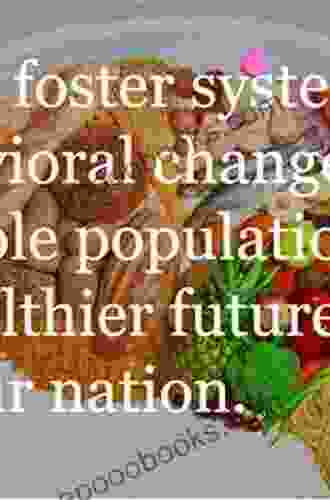Food Inequalities: Health and Medical Issues Today

Food inequality is a major public health issue, with far-reaching consequences for both individuals and society as a whole. Despite the fact that we live in a world of plenty, hunger and malnutrition remain a reality for millions of people around the globe. In the United States, for example, one in eight households experiences food insecurity, meaning that they do not have consistent access to enough food to meet their basic needs. Food insecurity is even more prevalent among certain populations, such as low-income families, people of color, and rural residents.
4.8 out of 5
| Language | : | English |
| File size | : | 965 KB |
| Text-to-Speech | : | Enabled |
| Screen Reader | : | Supported |
| Enhanced typesetting | : | Enabled |
| Word Wise | : | Enabled |
| Print length | : | 226 pages |
The causes of food inequality are complex and multifaceted. They include factors such as poverty, discrimination, lack of access to education and resources, and inadequate food policies. The consequences of food inequality are also far-reaching, affecting both physical and mental health. Food insecurity has been linked to a number of health problems, including malnutrition, obesity, diabetes, heart disease, and stroke. It can also lead to mental health problems such as anxiety, depression, and low self-esteem.
Addressing food inequality is a complex challenge, but it is one that we must take on if we want to create a healthier and more just society. There are a number of things that can be done to address this issue, including increasing access to affordable and nutritious food, expanding nutrition education programs, and advocating for policies that support food security.
The Causes of Food Inequality
The causes of food inequality are complex and multifaceted. They include factors such as:
- Poverty: Poverty is the most significant factor contributing to food insecurity. People who live in poverty often have difficulty affording enough food to meet their basic needs.
- Discrimination: Discrimination against certain groups of people, such as people of color and immigrants, can make it difficult for them to access affordable and nutritious food.
- Lack of access to education and resources: People who lack access to education and resources are less likely to know how to make healthy food choices and may not be able to afford to Free Download healthy food.
- Inadequate food policies: Inadequate food policies can make it difficult for people to access affordable and nutritious food. For example, policies that subsidize the production of unhealthy foods can make it difficult for people to afford healthy foods.
The Consequences of Food Inequality
The consequences of food inequality are far-reaching, affecting both physical and mental health. Food insecurity has been linked to a number of health problems, including:
- Malnutrition: Malnutrition is a condition that occurs when a person does not get enough nutrients from their diet. Malnutrition can lead to a number of health problems, including stunted growth, impaired cognitive development, and weakened immune systems.
- Obesity: Obesity is a condition in which a person has too much body fat. Obesity is a major risk factor for a number of chronic diseases, including heart disease, stroke, diabetes, and cancer.
- Diabetes: Diabetes is a chronic disease that affects the body's ability to use glucose for energy. Diabetes can lead to a number of complications, including heart disease, stroke, kidney failure, and blindness.
- Heart disease: Heart disease is the leading cause of death in the United States. Food insecurity has been linked to an increased risk of heart disease, even among people who are not overweight or obese.
- Stroke: Stroke is a condition that occurs when the blood supply to the brain is interrupted. Food insecurity has been linked to an increased risk of stroke, even among people who are not overweight or obese.
Food insecurity can also lead to mental health problems such as anxiety, depression, and low self-esteem. Food insecurity can make it difficult for people to focus on their work or school, and it can also lead to social isolation.
Addressing Food Inequality
Addressing food inequality is a complex challenge, but it is one that we must take on if we want to create a healthier and more just society. There are a number of things that can be done to address this issue, including:
- Increasing access to affordable and nutritious food: We need to make it easier for people to access affordable and nutritious food. This can be done by increasing the availability of healthy food in low-income communities and by providing financial assistance to people who need help affording food.
- Expanding nutrition education programs: We need to expand nutrition education programs to help people make healthy food choices. These programs can teach people about the importance of eating a healthy diet and how to prepare healthy meals on a budget.
- Advocating for policies that support food security: We need to advocate for policies that support food security. This includes policies that increase the availability of affordable and nutritious food, provide financial assistance to people who need help affording food, and promote healthy eating.
Food inequality is a major public health issue that affects millions of people around the world. The causes of food inequality are complex and multifaceted, and the consequences are far-reaching, affecting both physical and mental health. However, there are a number of things that can be done to address this issue and create a healthier and more just society.

4.8 out of 5
| Language | : | English |
| File size | : | 965 KB |
| Text-to-Speech | : | Enabled |
| Screen Reader | : | Supported |
| Enhanced typesetting | : | Enabled |
| Word Wise | : | Enabled |
| Print length | : | 226 pages |
Do you want to contribute by writing guest posts on this blog?
Please contact us and send us a resume of previous articles that you have written.
 Book
Book Novel
Novel Page
Page Chapter
Chapter Text
Text Story
Story Genre
Genre Reader
Reader Library
Library Paperback
Paperback E-book
E-book Magazine
Magazine Newspaper
Newspaper Paragraph
Paragraph Sentence
Sentence Bookmark
Bookmark Shelf
Shelf Glossary
Glossary Bibliography
Bibliography Foreword
Foreword Preface
Preface Synopsis
Synopsis Annotation
Annotation Footnote
Footnote Manuscript
Manuscript Scroll
Scroll Codex
Codex Tome
Tome Bestseller
Bestseller Classics
Classics Library card
Library card Narrative
Narrative Biography
Biography Autobiography
Autobiography Memoir
Memoir Reference
Reference Encyclopedia
Encyclopedia S E Schlosser
S E Schlosser S Enders Wimbush
S Enders Wimbush Tarja Simpanen
Tarja Simpanen J L Jarvis
J L Jarvis Sam Spendlove
Sam Spendlove Shawn Raiford
Shawn Raiford Steven M Cahn
Steven M Cahn Sl Huang
Sl Huang Katie Pavlich
Katie Pavlich Will Eno
Will Eno Rosie Clarke
Rosie Clarke Steve Cook
Steve Cook Tina Willer
Tina Willer Peter Robinson
Peter Robinson Tj Jefferson
Tj Jefferson Jillian Quinn
Jillian Quinn Samantha Whiskey
Samantha Whiskey Simon Curtis
Simon Curtis Robin S Brown
Robin S Brown Walter Kaweski
Walter Kaweski
Light bulbAdvertise smarter! Our strategic ad space ensures maximum exposure. Reserve your spot today!

 Haruki MurakamiChristmas in Shooting Star Canyon: A Heartwarming Cowboy Romance that Will...
Haruki MurakamiChristmas in Shooting Star Canyon: A Heartwarming Cowboy Romance that Will...
 J.D. SalingerMy First Brazzzeer Viktor Vagon: The Ultimate Guide to Brazilian Jiu-Jitsu...
J.D. SalingerMy First Brazzzeer Viktor Vagon: The Ultimate Guide to Brazilian Jiu-Jitsu...
 Leo TolstoyMy Riot: Agnostic Front's Grit, Guts, and Glory - A Gripping Tale of Hardcore...
Leo TolstoyMy Riot: Agnostic Front's Grit, Guts, and Glory - A Gripping Tale of Hardcore... Sammy PowellFollow ·10.3k
Sammy PowellFollow ·10.3k Fredrick CoxFollow ·8.6k
Fredrick CoxFollow ·8.6k Jorge Luis BorgesFollow ·13.3k
Jorge Luis BorgesFollow ·13.3k Edison MitchellFollow ·19.8k
Edison MitchellFollow ·19.8k Brennan BlairFollow ·18.2k
Brennan BlairFollow ·18.2k George BellFollow ·2.4k
George BellFollow ·2.4k Terry BellFollow ·12.6k
Terry BellFollow ·12.6k Isaiah PriceFollow ·9.3k
Isaiah PriceFollow ·9.3k

 Harry Cook
Harry CookRape Blossoms and White Sky: A Floral Symphony of...
A Kaleidoscope of Colors...

 Vic Parker
Vic ParkerThe Passion of Jovita Fuentes: Unveiling the...
Immerse yourself in the...

 Cormac McCarthy
Cormac McCarthySinners and Saints: A Dark New Adult High School Bully...
Sinners and Saints is...
4.8 out of 5
| Language | : | English |
| File size | : | 965 KB |
| Text-to-Speech | : | Enabled |
| Screen Reader | : | Supported |
| Enhanced typesetting | : | Enabled |
| Word Wise | : | Enabled |
| Print length | : | 226 pages |












